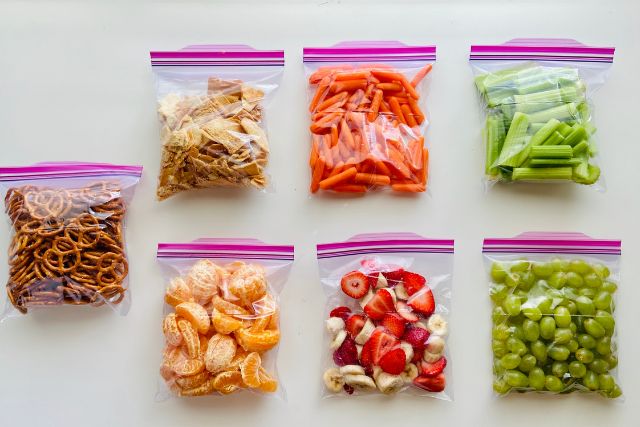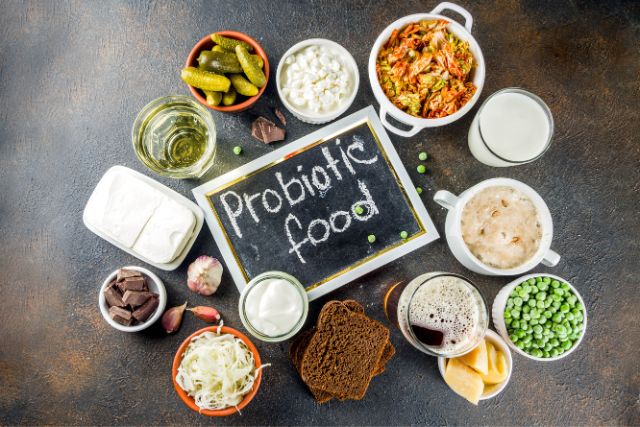Traveling as a family is exciting, but it can also expose us to new germs, disrupt routines, and increase the chances of feeling rundown. Don’t get me wrong—I love exploring new places, but I’ve learned that packing a few essentials and keeping some health basics in mind can really make a difference. Here are my top six tips for staying healthy on the go, especially if you’re traveling with children.
1. CHOOSE YOUR PRIORITIES BEFORE YOU GO

Eating while traveling will never be exactly like eating at home, and trying to maintain every aspect of your usual routine can add unnecessary stress. Instead, take a moment before you leave to decide on a few key things that matter most to you when it comes to meals and family routines.
For my family, one of my “non-negotiables” is eating with my children. When we travel with family and friends who don’t have young children, the need for early dinners is sometimes misunderstood. Many times, people suggest feeding our toddler separately so we can enjoy a “grown-up” dinner later. While this works for some families, we prioritize eating together, even on vacation, as it maintains a sense of normalcy and helps the trip run more smoothly. This may occasionally go against the group’s preferences, but it’s a priority for us.
Everyone’s priorities will be different, and that’s perfectly okay! Before heading on a trip, take some time to think about what’s important to you regarding meals and routines. Defining these boundaries can make your travels more enjoyable and help preserve what matters most to your family.
2. STAY AT AN AIRBNB OR A PLACE WITH SMALL KITCHEN

This is one of my top travel recommendations! When traveling with young children, staying somewhere with a kitchen—like an Airbnb—makes a world of difference. We avoid hotels unless they come with a kitchen because it’s so much more convenient to have a space to store food, prepare meals, and make snacks for the day. A kitchen also gives you the flexibility to eat with your child in a relaxed setting, rather than dining out for every meal.
Having access to a kitchen is truly a huge stress reliever! And depending on the size of your group, it’s often as affordable as or even cheaper than booking hotel rooms.
3. GROCERY SHOPPING

When you arrive at your destination, make a quick stop at a nearby grocery store or mini market to pick up some essentials. Look for convenient, nutritious staples like bread, cereal, fresh milk, fruits, crackers, or any family favorites.
A day of sightseeing and activities requires long-lasting energy. Hotel breakfasts often rely on refined carbs, which may cause blood sugar spikes and lead to energy crashes. Choose a balanced breakfast with protein, fiber, and healthy fats to help keep you full and energized for longer. If you’re staying somewhere with a kitchen, consider how many meals you plan to eat out. For breakfast, I like to stick to simple options like oatmeal, toast, peanut butter or eggs. These are quick to prepare and provide a solid nutritional start to the day. This simple step makes it easy to stay on track with meals and avoid the expense (and stress) of dining out for every meal.
4. PACK NUTRITIOUS SNACKS

When traveling, finding snacks that aren’t just salty or sugary treats can be a challenge. While it’s fine to enjoy those occasionally, offering more nourishing options can help everyone feel better and keep energy levels stable throughout the trip.
If possible, pack homemade snacks like healthy cookies or muffins for the journey. If that’s not an option, make sure to add nutritious snacks to your grocery run when you arrive. A few wholesome snacks on hand can make a big difference in keeping everyone satisfied and happy.
- fresh fruits (apples, bananas, grapes, berries, guava)
- hard-boiled eggs
- mini sandwiches
- granola bars
- trail-mix
- granola
- yogurt
- whole grain crackers
5. LOAD UP ON FRUITS AND VEGETABLES

Aim to have at least one meal a day packed with fruits and vegetables. These nutrient-dense foods boost the immune system and keep energy levels steady. If possible, try adding fresh fruits to breakfast or snack times to aid digestion and improve nutrient absorption. In areas where food safety might is a concern, opt for cooked vegetables or peeled fruits to avoid potential contamination.
Here are some additional ideas to sneak more fruits and veggies into your family’s diet while traveling:
- Smoothies on the Go: Many hotels offer smoothie options that include fruits and vegetables like spinach, kale, or carrots. Grab one for a quick and nutritious snack.
- Portable Produce: Bring easy-to-pack fruits and vegetables like apple slices, grapes, guava, berries, carrot sticks, cucumber, and cherry tomatoes. These travel well and are great for snacking on the road.
6. PROBIOTICS FOR DIGESTIVE HEALTH

Traveling often throws our digestive systems off balance. Irregular schedules, unfamiliar foods, and exposure to new bacteria can lead to bloating, constipation, food poisoning, and traveler’s diarrhea (TD). Among these, bloating and constipation are especially common when traveling.
Probiotics—typically a mix of beneficial bacteria such as Lactobacillus, Bifidobacterium, and Saccharomyces—are helpful in maintaining digestive balance. They work by forming a protective barrier along the intestinal lining, which guards against harmful bacteria entering the body through food or water.
Incorporating probiotics into your daily routine can support digestion and strengthen immunity, particularly when traveling. It’s best to start taking probiotics at least two weeks before your trip to allow the beneficial bacteria to establish in the gut. For optimal effectiveness, continue taking them throughout your travels and for at least two weeks after returning home.
Key Points for Selecting a Travel-Friendly Probiotic:
- Shelf Stability: Choose a probiotic that doesn’t require refrigeration to ensure it remains effective on the go.
- Expiration Check: Verify that the expiration date extends beyond your travel dates to maintain its potency.
- CFU Count: Aim for a probiotic with around 30 billion CFUs (colony-forming units), which is generally recommended for travel-related digestive support.
- Diverse Strains: Select a formulation containing multiple strains, especially Lactobacillus and Bifidobacterium, to support a balanced and resilient gut flora.
7. PACK IMMUNE-BOOSTING SUPPLEMENTS

It can be challenging to get a variety of nutrients while traveling, so taking a quality multivitamin or immune-boosting supplements can be beneficial. Elderberry has become a travel essential in our family, thanks to its immune-supporting benefits during trips.
While research (here, here) on elderberry is still developing and limited studies exist, early findings show that elderberry can reduce the severity and duration of colds and flu-like symptoms when taken at the first sign of illness. Though it doesn’t prevent you from getting sick, elderberry seems to strengthen the immune system’s response, helping the body fight off viruses more effectively by potentially stopping their replication.
To get the most benefit from elderberry while traveling, it’s essential to start taking it within 24 hours of feeling any symptoms. This timing can make a notable difference in limiting the duration and intensity of illness. Here’s how to use it during travel:
- Timing Matters: Begin with elderberry as soon as you sense the onset of symptoms. Taking it within the first 24 hours of symptoms may maximize its effectiveness.
- Therapeutic Dosing: Follow dosing instructions on the bottle, usually 2-4 times per day at the onset of symptoms. For travel, I keep it in our kit and use therapeutic doses a day before and during travel to support our immunity when we need it most.
- Convenience for Travel: Elderberry comes in various forms—liquid, capsules, gummies, and even powder—making it easy to pack and take on the go.
- A Pre-Trip Routine: On past trips, we’ve given therapeutic doses to everyone before flights or long travel days. For the first time, no one came down with a fever or worsened symptoms, and we were able to enjoy a healthier trip.
Be aware that elderberry is generally safe for adults, but it’s essential to talk to a healthcare provider for guidance on its use, especially for young children and anyone with autoimmune conditions.
8. PRIORITIZE REST AND RECOVERY

Excitement and packed schedules can cut into sleep, but quality rest is essential to stay healthy. Aim for at least 6 hours of sleep per night, as this helps your immune system stay resilient. Consider packing a few sleep aids like melatonin (remember, less is more with melatonin), a portable white noise machine, or comforting items like a favorite pillow or blanket to help you relax. Smartphones also have “bedtime” settings that remind you to wind down at a certain hour, ensuring you get the rest needed to recharge for the day ahead.
9. PRACTICE GOOD HYGIENE AND MINIMIZE GERM SHARING

Hand hygiene is one of the most effective ways to avoid picking up germs while traveling. Carry hand sanitizer for times when soap and water aren’t available, and be mindful of sharing utensils, cups, or water bottles—especially if someone in the family has a cold or runny nose. While sharing is caring, avoiding germ transfer helps everyone stay healthy and enjoy the trip.
10. GET A FLU SHOT BEFORE YOUR TRIP

One of the most effective steps to keep your family healthy on vacation is to get the flu shot. Research consistently shows that flu vaccines not only reduce the likelihood of contracting the flu but also lessen the severity and duration of symptoms if you do get sick. For added protection, plan to get the flu shot at least two weeks before your trip to give your immune system time to build up resistance.
If you and your children haven’t received your flu shots yet, make it a priority before traveling. This small step can make a big difference, helping you enjoy a healthier, more worry-free vacation.
BOTTOM LINE
With these strategies in place, you’re ready to make the most of your travels while keeping everyone in the family feeling their best. Remember, small health-conscious choices can make a big difference in enjoying a smooth and illness-free vacation!

